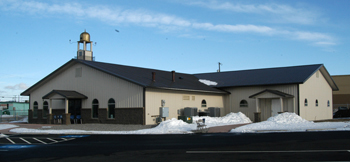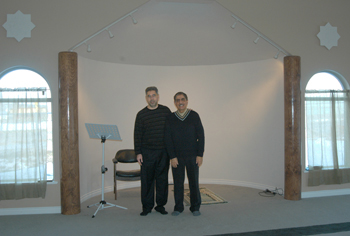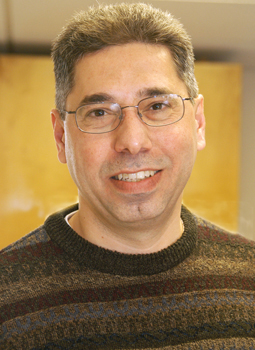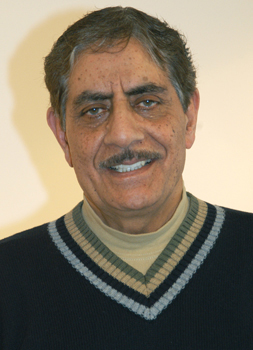Islamic center’s new mosque promotes peace, love, caring
The Spokane Islamic Center’s new mosque at 6411 E. Second gives the center more space for their faith community and space to welcome people to come to learn about Islam as a faith that promotes peace, love and caring.
 |
| Spokane Islamic Center |
They particularly invite other “people of The Book,” Jews and Christians, with whom they share common roots from Abraham.
Their new website at www.spokaneislamiccenter.org expresses their goal “to cherish the bonds of friendship and understanding between Muslims and non-Muslims in the community.”
While media dwell on wars, conflicts and violence that divide faiths and forge enemy images, Mamdouh El Aarag and Nissar Shah hope Spokane’s first mosque can be a center for dialogue and relationships that counter the common connection of the name of their faith with “terrorists.”
 |
| Mamdouh and Nissar inside new mosque |
While the mosque will host a grand opening in late spring when construction is completed, Muslims from throughout the region already gather there Fridays for noon prayers and evening meals.
Dialogue is integral to the life of the Spokane Islamic Center, because the Muslim community of more than 1,100 in the region come from such diverse cultures—Kashmiri, Bosnian, Syrian, Palestinian, Indian, Pakistani, Arabic, Jordanian, Iraqi, Libyan, Senegalese and other African ethnicities.
While they are from different languages, cultures, nations and world views, they share a common faith and worship together as they settle here.
Many Muslims, such as Mamdouh, who is president of the council, and Nissar, a past president, came as students and stayed. Spokane is now their home.
The Spokane Islamic Center draws about 50 students from Gonzaga and Eastern Washington University, where the number of Saudi Arabian and other Middle Eastern students is on the rise.
About 500 Muslims in the area have come to the mosque during the two Muslim celebrations, Eid ul-Fiter after the month of Ramadan and after the pilgrimage to Makkaha (Mecca) for Haj.
The 6,000-square-foot metal-sided building has a cupola over the east end. Inside, the men’s and women’s sections each have 2,000-square feet and there is another 2,000-square-feet for multipurpose uses. The Sunday school meets in the women’s section.
Walls are subdued beige. The floors in the men’s and women’s sections are carpeted with alternating stripes—narrow dark green and wider light green—designating rows for standing, kneeling and bowing in prayer. A wall separates the men’s and women’s sections, so women watch the prayers projected on the wall facing east.
Most of the funds for construction are from local donations. Some are from Seattle, Mamdouh said.
At their former location, a house at 505 W. Wedgewood that is now for sale, there was capacity for about 100. The Spokane Islam Society first incorporated as a nonprofit in 1979.
“This is more centrally located and feels like a mosque,” he said. “Our move has drawn more people because some have seen it from the freeway.”
Mosque leaders plan to host workshops for Muslims and other faiths, so that it can be an interfaith center.
One of its first interfaith gatherings will be at 2 p.m., Sunday, Feb. 22, for a meal and Christian-Muslim dialogue, co-sponsored by Bethany Presbyterian Church. The Presbytery of the Inland Northwest is hosting a listening team with a Muslim and a Christian from Pakistan to tell of how they live together in Pakistan.
The mosque is volunteer run, so volunteers shovel the parking lot, shovel snow off the roof, do building maintenance, organize activities and lead the prayers.
 |
| Mamdouh El Aarag |
Five members of the council, including Mamdouh and Nissar, have been trained to lead the prayers. The volunteers take turns reading the Quran, leading prayers and delivering the messages.
The message of the speaker on Jan. 12 focused on Allah forbidding oppression: “Do not oppress each other. Oppression can occur in different forms. The most offensive is revolution or rebellion against authority that harms people and religions.”
The leader said that those who oppress will face painful torment, because there is no worse sin.
Mamdouh said those who deliver sermons research the theme on the internet, taking ideas from approved sermons.
“Our next goal is to bring a full-time leader, an imam, to conduct the services,” he said.
In the early 1980s, the Spokane Islamic Center began meeting at the house. It grew out of prayer groups at Gonzaga University and Eastern Washington University.
While many students went back to their homelands, those who stayed formed the center.
Mamdouh first came to the United States in 1982 and in 1986 came to Spokane to study civil engineering at Gonzaga University. He works as an environmental engineer in wastewater management with the Washington State Department of Health.
“I stayed, as many have, because I do not have a country to go back to,” said Mamdouh, whose uncles and cousins are in Gaza. He and his wife are Palestinian.
 |
| Nissar Shah |
Nissar, who came from Kashmir in 1970 to study engineering at Gonzaga University, said that “the mosque has been a dream for a long time, so we would have a place for Muslims to gather, but also for Muslims, Christians and Jews to come to learn that Islam is peaceful.”
For many years, he went to church with friends from Gonzaga. He has visited different churches. He also appreciates interfaith gatherings, such as for the United Nations’ International Peace Day in September at Unity Church.
“We need to respect each other,” he said.
“Now we are blessed to have a beautiful place to welcome people to come to dinners and gatherings,” said Nissar, an engineer who works for the City of Spokane. “I married and my children were born here, so this is our home,” he said.
“The languages and traditions in the Muslim community here give us connections that go around the world,” he said. “In the mosque, we live peacefully with people from the Middle East, Kashmir, Pakistan, India and Bosnia. We eat together. We do not all agree.
“Our sermons are about peace and loving each other. Our Creator is one,” he said.
Nissar, who visits family in Kashmir every few years, wants people to gather for workshops and dialogue to share their knowledge for the benefit of all humankind.
“We worship the same one God. We are a peaceful people, even though the world has its ups and downs,” said Nissar, who has led prayers as one of the volunteers for nearly 10 years.
“It’s a big responsibility. The Creator is one, so all people should be compassionate to each other,” he said. “In the Koran, we are told we are not created for nothing. Our job is to help all people.
“If a neighbor is suffering or struggling, no matter what his or her religion is, the Muslim neighbor is to make sure to take care of our neighbor,” he explained.
“The key to keeping our children away from drugs, lying, cheating and dishonesty is to teach and practice our faith. We teach our children so they will not waste their lives but will grow up to help people.”
Nissar said that Islam has a powerful influence that means few Muslims are in jail. They are not to drink alcohol, commit adultery or use drugs.
“Teaching right living comes from parents spending quality time with their children,” he said.
In addition to their invitation for people to come to the mosque to learn about Islam, Mamdouh and Nissar said they are available to visit churches and give educational programs.
For information, call 482-2608. www.spokaneislamiccenter.org
Copyright©February 2009 - The Fig Tree




